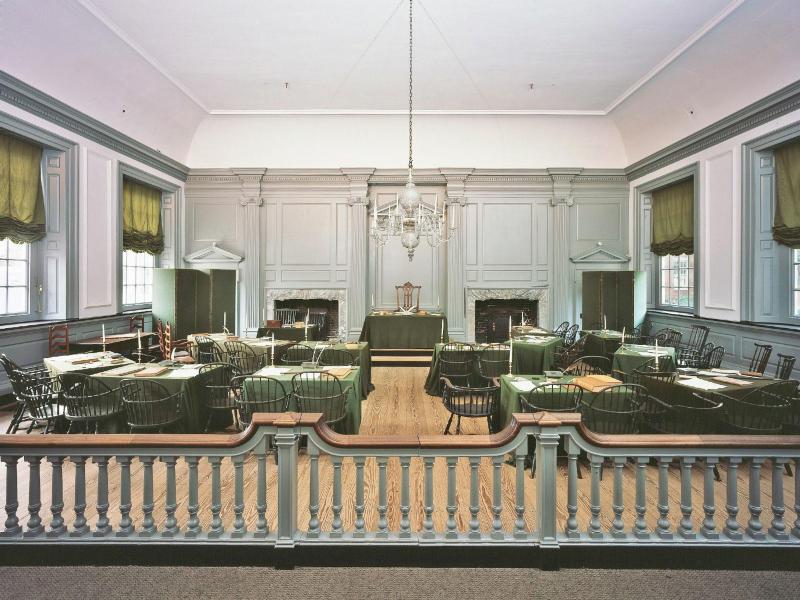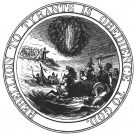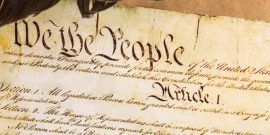The Original Meaning of “High Crimes and Misdemeanors,” Part II
Yesterday, I set forth the evidence of a four-hundred year English backdrop history of use of the language “high crimes and misdemeanors” as a standard for impeachment of high crown officials. Today, I turn to the Constitutional Convention at Philadelphia, in 1787. Simply put: the records of the debates at the Constitutional Convention show that the framers deliberately borrowed the concept of impeachment – and even the specific term “high Crimes and Misdemeanors” – from the English experience. To be sure, the debates at Philadelphia were not public and of course did not constitute any part of the official record of the meaning of the Constitution’s text as debated and ratified by state ratifying conventions. But they of course are highly instructive as to the meaning of the language used, and the general understanding of such language, as displayed by how it was used by the informed speakers actually using it, and choosing it, because of its well-recognized, received meaning.
To compress drastically, but not unfairly, a wide-ranging discussion: A power of impeachment was present in all of the major proposals submitted early in the convention – the Virginia plan, the New Jersey plan, and Hamilton’s plan. The delegates agreed early on to a resolution making the chief executive subject to impeachment. (There was continuing back-and-forth over what institution(s) should possess the power of impeachment and trial, with several early proposals and drafts vesting the trial of impeachments in the judicial department before the framers eventually returned to the English model of impeachment by the lower house and trial by the upper house.) Impeachability of the head of the executive department was a departure from English practice, under which the King’s ministers and judges were subject to impeachment, but not the King himself. [1]
As to the impeachment standard itself, the Constitutional Convention considered a number of formulations before finally returning to the familiar English-practice standard of “high crimes and misdemeanors.” Early discussion centered largely on the idea of abuse or misuse of official government power. On June 13, the report of the “Committee of the Whole” included a resolution that the executive would be removable “on impeachment and conviction of malpractices or neglect of duty.” In a subsequent debate, George Mason referred to “corruption” as grounds for impeachment. Gouverneur Morris, who went back and forth on whether the president should be impeachable at all, eventually affirmed that a power of impeachment was necessary to guard against a president “corrupting his electors” to gain office, betraying his trust, being in foreign pay, or engaging in “bribery,” “treachery,” or other corruption. Edmund Randolph said impeachment was needed to guard against a president “abusing his power.” James Madison spoke broadly of impeachment as necessary to protect the people against “negligence” or “perfidy” (that is, dishonesty), warning that a president might “pervert his administration into a scheme of peculation [self-dealing] or oppression” or “betray his trust to a foreign power.”
Committees then did what committees do: level out, smooth out, compromise, erase detail, and arguably render more vague. The “Committee of Detail” draft of August 6 chose “Treason or Bribery, or Corruption” as grounds for impeachment. On August 20, the “Committee of Five” was directed to propose “a mode of trying the supreme Judges in case of impeachment,” which eventually led to the Constitution’s language extending the power of impeachment to all “civil officers.” The “Committee of Eleven” draft of September 4 dropped, without apparent explanation, the words “or Corruption” from the proposed impeachment standard.
This led to the most notable and important of the floor debates at the Convention over the ultimate language of the impeachment standard, on September 8.
The clause referring to the Senate, the trial of impeachments agst. The President, for Treason & bribery, was taken up.
COL. MASON. Why is the provision restrained to Treason & bribery only? Treason as defined in the Constitution will not reach many great and dangerous offences. Hastings is not guilty of Treason. Attempts to subvert the Constitution may not be Treason as above defined. As bills of attainder which have saved the British Constitution are forbidden, it is the more necessary to extend the power of impeachments. He movd. To add after “bribery” “or “maladministration”. Mr. Gerry seconded him –
Mr. Madison. So vague a term will be equivalent to a tenure during pleasure of the Senate.
Mr. Govr Morris, it will not be put in force & can do no harm – An election of every four years will prevent maladministration.
Col. Mason withdrew “maladministration” & substitutes “other high crimes & misdemeanors agst. the State”
All of this is illuminating. Mason’s objection was that “treason and bribery” was insufficiently broad and encompassing. It certainly did not capture the full range of earlier discussions of the impeachment standard. In particular, it did not reach “many great and dangerous offences” including attempts to “subvert the Constitution” that fell short of “Treason” as defined by the Constitution. Mason’s reference to “Hastings” obviously was to the impeachment of Warren Hastings, which, as noted above, had been initiated just a few weeks before the start of the Philadelphia convention and was evidently familiar to the delegates as a prominent illustration of the traditional impeachment power. Recall also that Hastings was at the time being impeached for “high crimes and misdemeanors” in the form of misuse or oppressive use of governmental power. Mason’s point was that misuse of government power and subversion of the Constitution would not constitute treason but should be regarded as impeachable.
But Mason’s first choice of a catch-all term – “mal-administration” – drew Madison’s objection as to vagueness. This might reduce the executive to service at the pleasure of two-thirds of the Senate, Madison feared. Whereupon, Mason proposed the substitute “other high crimes and misdemeanors against the state” – the more familiar term of art drawn from longstanding English practice. The substituted language was a reasonably close substitute for mal-administration. (Recall that Blackstone had classed as a “high misdemeanor” the mal-administration of high officers of government.) But “high Crimes and Misdemeanors” arguably had a more precise and more familiar meaning drawn from longstanding English practice and usage, of which the framers evidently were aware. The specific historical term-of-art clearly retained the idea of abuse of authority or official misconduct as impeachable offences. But it gently shaded more in the direction of requiring some form of culpable, wrongful conduct and away from any intimation that ordinary political disagreements over administration were sufficient grounds for removal – which had been Madison’s concern.
It is thus a slight overstatement to say, as some commentators have said, that “mal-administration” was rejected as a ground for impeachment. It is more accurate to say that concerns over the possible vagueness of the word were redressed by repairing to the familiar, general term-of-art “high Crimes and Misdemeanors,” a term probably nearly as capacious but at least somewhat more precise, and arguably importing a sense that the officer must be found to have behaved in a way that can be judged wrongful (in some sense) and not properly permitting removal over ordinary disagreements “at the pleasure” of the legislature.
At all events, Mason’s amendment to his own amendment seemed to have satisfied almost everybody. It carried, by vote of eight states to three. It apparently satisfied Mason’s concern that the description of impeachable offenses embrace acts subverting the Constitution and abusing official authority but falling short of treason. And it apparently satisfied, or at least mitigated, Madison’s concerns as to vagueness. Madison did not renew that particular objection. (And the Virginia delegation voted “Aye.”) Madison seemingly recognized that the standard remained one conferring a broad range of judgment, for moments later he objected to the Senate being the forum for trying impeachments, in part because the standard remained broad: Madison “objected to a trial of the President by the Senate, especially as he was to be impeached by the other branch of the Legislature, and for any act which might be called a misdemeanor.” But that objection did not carry the day; Madison’s motion to strike out the words “by the Senate” was defeated by a vote of two states favoring to nine against.
The evidence of original meaning, drawn from the English background experience and from the framers’ linguistic choices, is fairly clear: the impeachment standard chosen by the framers – “high Crimes and Misdemeanors” – possessed a recognized historical meaning derived from long practice and usage; that meaning was broad, extending well beyond ordinary criminality, and including a variety of perceived offences of a “political” nature involving injuries to the constitutional system or abuse of government authority; the framers were familiar with and consciously drew upon that broad meaning and traditional understanding, adopting it in preference to other formulations (and over certain objections).
Next week, I will set forth evidence from ratification-era writings and debates that confirms this broad original understanding of the meaning of “high Crimes and Misdemeanors.”
[1] The person of the king was considered inviolable. Thus, “removal” of a king – the head of the executive – typically entailed removal of the head of the executive, a fact commented on by Benjamin Franklin at the Constitutional Convention as a reason why it might be in the executive’s interest, as well as the nation’s, to permit impeachment of the president.


